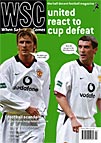 The most annoying fan in Brazil and quite possibly the world meets the women of Iran and Scotland star Lord Bron in Ian Plenderleith's latest surfing review
The most annoying fan in Brazil and quite possibly the world meets the women of Iran and Scotland star Lord Bron in Ian Plenderleith's latest surfing review
There are always new and arguably useless things to learn about football. Once you’ve been to Futebol, a website founded by writer Alex Bellos to promote his acclaimed book about Brazilian football, you’ll discover that no one in Brazil has any idea how many professional clubs there are in the country because new ones open and close every week. One sports paper lists almost 800 in its encyclopaedia, while another claims that “only” around 300 are actually operational.
Such fact-probing illustrates that Futebol is in fact less a manifesto for Bellos’ tome and more of an English-language home for the Brazilian game in general. While the author writes articles for the site that promote highly critical discussion among readers, there’s plenty more besides on this conveniently designed homepage.
For example, you can also unearth fascinating individual facts on a state-by-state basis. In Mato Grosso, a group of Indians called Pareci have for hundreds of years played a game with a home-made latex ball, zicunati, which is a cross between heading practice and volleyball. In 1922 a group of them travelled to Rio to demonstrate it in the city’s main football stadium but the game never caught on (although that probably won’t stop it becoming an Olympic sport).
Then there’s Brazil’s most irritating fan, from the state of Pernambuco, who used to stand behind the away bench playing a large antique radio at full volume while swearing at the coaches and substitutes throughout the match. Or the deputy of the Brazilian Football Confederation (CBF) who allegedly bought mayoral votes in the poverty-stricken state of Piaui by giving out CBF keyrings.
Those with a really keen interest in the South American game can download all four volumes of the Brazilian Senate’s inquiry into corruption in football (in Portuguese). I opted instead for the intriguing samples from a compilation of samba- and folk-influenced Brazilian football songs.
Focusing on another football-obsessed nation, Iran Kicks covers stories like the one about Tehran’s Paykan Club, which in January became the first club in Iran to allow women to attend matches. This was, according to its manager, because the club’s fans don’t use obscene chants and the female fans improve his players’ morale.
“On Thursday,” the site reported, “half a dozen jubilant women appeared at Iran Khodro Stadium, west of Tehran, to watch a first division league soccer match between host Paykan and Barq of Shiraz in southern Iran.” The last women able to attend a game in Iran had been Irish, at the World Cup play-off, who were allowed in because they would not, it was presumed, understand the obscenities yelled by Iranian males.
A number of editorials take on issues such as the rise of Asian football, whether Iran should have a foreign coach, and why Iranians who attended a game between the US and Iran in Pasadena shouldn’t have waved the pre-revolutionary national flag. One piece fondly reminisces about watching Iranian domestic games on a portable black and white TV several decades ago, recalling: “When one of the goalies made another remarkable save, my great grandmother uttered a huge scream saying, ‘What the hell is the man in the box doing? He is preventing the ball from going into the goal!’”
Chances are that she didn’t yell the same thing if she was still around to see Alan Rough in action. For this is also the elusive site many Scotland fans will have been looking for in order to complete their video archive of Tartan World Cup Glory – possibly one of the few places on the net where you can buy a recording of Iran v Scotland in the 1978 World Cup for little more than a fiver.
And while we’re on the subject of English-language websites about foreign countries dealing with the inferiority complexes of fourth-tier footballing nations, take a ride to the wondrous First Foot, a site devoted to Scottish myth-making that contains a fair share of football content. Take the profile of apparent Scotsman Lord Byron that kicks off with: “Byron is as Scottish as many modern football players, possibly more so. The fact that he was born with a club foot may give him an edge over the current crop of ‘professional’ players.”
For the best football stuff, though, turn first to Paw Broon’s Diary, where the resident diarist rants at length on Scotland’s failure to land Euro 2008. “Thurr no even proper fitba countries,” he protests. “Take the Swiss – thurr best known team, Grasshoppers of Zürich, are a bunch ay insects fer goadssakes.”
If Paw Broon’s rantings should remind you of any Scotsman of your acquaintance, then the saga of Fourth Lanark will ring further familiar bells in its Rabelaisian satire on the state of the Scottish game. Taken over by the Italian PR Lunatico, Fourth sign banned players from across Europe with names like Bampotti and Sendimov in a bid to dominate the Scottish league and bring honours to Cowpat Park in the Interjokey Cup. TV rights disputes, drug scandals and moves to leave for the English league are all underlined with vacuous threats and entreaties from the Scottish FA.
Actually, that’s not satire at all, is it?
From WSC 194 April 2003. What was happening this month